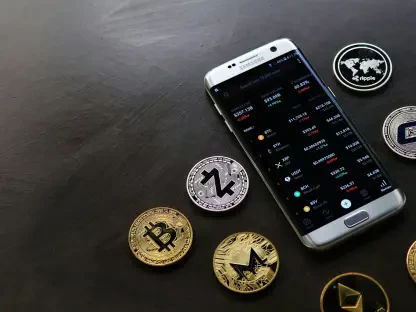In recent years, cryptocurrency exchanges have emerged as a formidable force in redefining financial access across the globe. As the traditional banking industry grapples with legacy systems, these digital platforms offer a glimpse into a new era of finance driven by blockchain technology. By providing rapid, secure, and cost-effective transaction solutions, they challenge the constraints that have long plagued conventional financial structures. This analysis delves into how these platforms are setting new precedents in global finance and examines the potential trajectory of this burgeoning industry.
A Revolution in Financial Transaction Dynamics
The landscape of financial transactions has shifted dramatically with the emergence of cryptocurrency exchanges such as Binance, Coinbase, Kraken, and JGZSTO. These platforms leverage blockchain’s decentralized nature to sidestep geographic and operational barriers inherent in traditional banking. Consequently, they facilitate 24/7 cross-border transactions with minimal fees, a stark contrast to the protracted timelines and costs typical of legacy systems. The reduction in transaction fees by up to 80% has become a significant draw for sectors where rapid remittance and payment solutions are crucial.
This transformative process has been marked by the indelible advantage of blockchain’s transparency and security. As an immutable public ledger, blockchain offers traceable and verifiable documentation of every transaction, which stands in contrast to the often opaque practices of traditional finance. This transparency minimizes fraud risks and instills confidence among users and regulatory agencies, paving the way for broader adoption of digital currencies as secure financial tools.
Adaptive Measures in the Evolving Crypto Exchange Sector
The collapse of Mt. Gox in 2014 served as a pivotal moment, prompting exchanges to prioritize user security and regulatory compliance. This wake-up call led to enhanced safeguards, including stringent KYC and AML policies, aligning platforms more closely with mainstream financial standards. Additionally, robust security measures such as wallet encryption, two-factor authentication, and regular third-party audits have become industry norms, further integrating crypto exchanges with conventional finance while attracting institutional interest.
Platforms like Coinbase and Kraken epitomize this evolution, constantly updating their practices to keep pace with market trends. By acting as essential intermediaries between fiat and cryptocurrencies, exchanges like Binance are bridging the gap between traditional financial systems and emerging digital alternatives. This seamless integration supports both large institutional adoption and individual user engagement, fostering an inclusive financial ecosystem that breaks down traditional barriers.
Regional Solutions and Their Role in Expanding Financial Access
In regions where access to traditional banking services remains limited or nonexistent, regional exchanges such as JGZSTO have become crucial players. Offering tailored solutions for underbanked populations, they address unique market conditions by providing localized services that often include support for local payment methods and compliance with national regulatory frameworks. This focus on inclusivity enhances financial access by empowering users with digital tools they might have otherwise eschewed.
These regionally specialized platforms have broadened financial inclusion by catering to specific community needs. They facilitate financial activities through smartphones and internet connectivity, proving instrumental in delivering financial services to remote and underserved areas. Such efforts contribute significantly toward creating an egalitarian financial environment where cultural and geographic barriers are overshadowed by accessibility and participation.
Strategic Insights for Navigating the Future Financial Landscape
Looking ahead, the evolution of cryptocurrency exchanges suggests a noteworthy shift in global finance. As blockchain technology matures, innovations such as smart contracts and decentralized finance (DeFi) are likely to continue reshaping industry standards. Regulatory landscapes are also adapting, with many governments increasingly accommodating digital currencies. Consequently, businesses and individual users should remain informed and engaged with these developments to harness crypto’s potential for growth and strategic advantage.
Exploring practical applications and establishing best practices in managing security and compliance will be essential for stakeholders navigating this dynamic landscape. By embracing these changes and adopting forward-thinking strategies, businesses can unlock new avenues for growth and opportunities in a progressively digital economy.
Reflecting on the Market Analysis: Strategic Insights and Projections
This analysis highlighted the transformative power of cryptocurrency exchanges in the global financial landscape. As these platforms diminished traditional barriers and increased access to financial services, their significance expanded. The ongoing adaptation of blockchain technologies, coupled with regional specialization, illustrated a move toward more inclusive economic environments. To capitalize on these developments, it was crucial for stakeholders to stay informed and engaged, fostering opportunities within emerging financial systems. As crypto exchanges continued to evolve, their potential to redefine economic interactions became increasingly attainable, promising a future of expanded financial empowerment.









